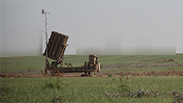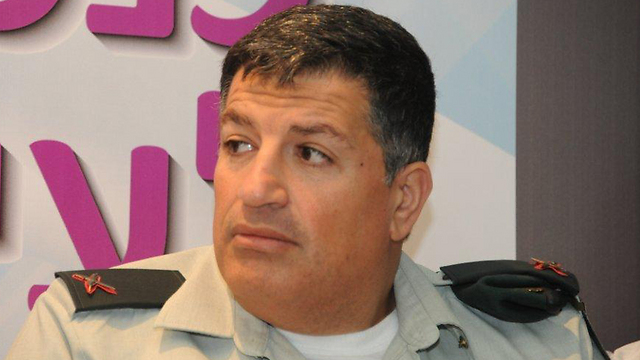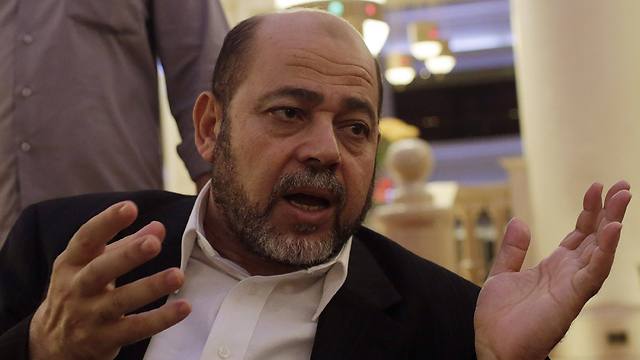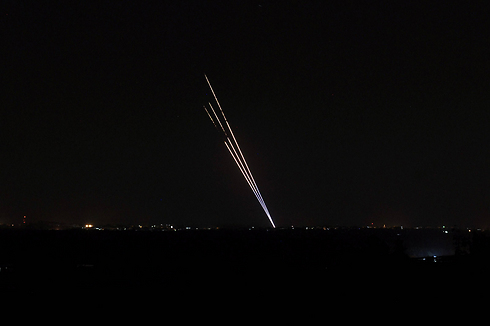
Working to prevent another round in Gaza
Analysis: Key players seek an agreement to forestall next conflict, but major sticking points remain as game of intricate Middle East politics gets muddier.
Several key players are currently working behind the scenes in an effort to prevent any unpleasant surprises and forestall the next Israel-Hamas conflict for as long as possible.
Among those involved in these efforts are Qatari diplomat Muhammad al-Ahmadi, who heads the Committee to Rebuild Gaza and is acting on behalf of Emir of Qatar Sheikh Hamad bin Khalifa Al-Thani; former Bulgarian foreign minister Nikolay Mladenov, who was appointed in 2013 to serve as UN Secretary-General Ban Ki-moon's special coordinator for the Middle East peace process; Moussa Abu Marzouk, the long-serving deputy to Hamas political leader Khaled Mashal; and Major General Yoav (Poli) Mordechai, Israel's coordinator of government activities in the territories.
When I visited Doha last month, a senior Qatari Foreign Ministry official told me about a series of secret meetings that have taken place between Mordechai and al-Ahmadi.

According to the official, "Al-Ahmadi met two or three times with Poli in Israel, and they met once more in one of the Arab states.
"At these meetings, he continued, "they came to understandings concerning the urgent need to rebuild Gaza, deal with the humanitarian issues, and prevent the next round of conflict.
"It was important for us to make it clear to the Israeli general that our intentions are to play a part in the rebuilding of Gaza and not to fund terror. No one wants rockets fired at Israel. Hamas is weak and tired."
It appears now that the Hamas leadership (political, not military) has been hinting at its desire for a long-term truce with Israel for quite some time, with indications of this appearing for the first time just two months after the end of Operation Protective Edge.
Initially, Gazan businessmen with permits to leave the Strip and enter Israel were chosen to relay vague messages; they encountered a brick wall on the Israeli side.
A month later, however, the messengers from Gaza delivered a 10-point outline plan for putting an end to the rocket attacks, along with a document proposing a year-long "rolling truce" that could be extended to five years if Israel agrees to the Hamas demands.
"Hamas did its homework very thoroughly," says one Israeli official. "They prepared a plan for the rebuilding of the destroyed neighborhoods; they spoke about the distress and despair among the potentially volatile homeless population; and they laid out an impressive list of sources of funding.
"All this was accompanied by an adamant demand for the establishment of an airport and seaport, and the unrestricted opening of the border crossings into Israel and Egypt."
This second fishing expedition was also rejected by the Prime Minister's Office and the Defense Ministry. But, says the Israeli official, Hamas did not give up.
"They began taking the matter up in earnest with every Western diplomat or foreign envoy who visited the Strip," the Israeli official recounts.
"They approached the European Union and the UN's special envoy; and they improved and amended their 10-point plan and asked the mediators to make it clear to Israel on behalf of the Hamas leadership that if Jerusalem fails to respond positively, preventing the next round of fighting would be impossible."
Fruit and vegetables from Gaza
Now, too, with Israel gradually lifting the blockade (in recent weeks, some 1,000 people are being allowed out of Gaza every day), with Qatar permitted to send food and equipment to Gaza, and with 92,000 Gazans in possession of building materials (after having their names recorded to ensure that the materials are not used for the construction of tunnels), officials in Jerusalem are still insisting that neither direct nor indirect talks are underway and that there's no need to sit around waiting for an agreement.
That said, the situation on the ground does appear calmer. "Hamas is thwarting the efforts of other terror groups to provoke Israel," says the senior Israeli official. "Israel is rewarding them by hooking Gaza up to Israel's natural gas supply and the desalination project. An additional water pipe and another electricity cable have been laid from Israel."
Last weekend, Abu Marzouk traveled from Gaza to Qatar to update Khaled Mashal and present him with the document drawn up by Mladenov. The document, the most updated truce proposal, bears no Israeli fingerprints, and even its title is noncommittal.
It doesn't speak of a truce period of five or 10 years, as published elsewhere, but instead offers a catchy formula: In exchange for total quiet from Gaza, Israel and Egypt will gradually lift the blockade and provide Gaza with economic incentives – first and foremost in the form of allowing Gazans to export fruit and vegetables to Israel during the "shmita" year, the year in which Israeli farmers are required under Jewish law to let their lands lie fallow.
The longer the agreement holds, says an Israeli official, the easier it will be to extend it and reward the Gazans for "good behavior."
One of the main stumbling blocks on the road to any truce agreement concerns the establishment of a seaport in Gaza. In this regard, it is important to draw a distinction between Hamas' political leadership in Gaza, which is looking for ways into the royal palace in Saudi Arabia and the presidential bureau in Cairo, and the organization's military wing, which insists on remaining loyal to Iran.
Hamas' military wing has made clear that there will be no understandings or agreements until such time as Israel agrees both to the establishment of a seaport in Gaza and the release of Hamas prisoners. Without a seaport, the military wing says, there's nothing to discuss. On the other hand, a very high-ranking Israel Defense Forces official says the following: "A seaport? We haven't lost our minds just yet. It'll never happen."
But even if the sides do reach an agreement in principle on the establishment of a seaport, the question of who will supervise its operations to make sure it doesn't become a gateway for Hamas to smuggle arms and ammunition into Gaza remains an open one.
Hamas has proposed NATO supervision in the form of Turkish forces; but Israel will never agree to Turkish involvement and will insist on the same Israeli electronic monitoring of incoming and outgoing goods that is in place at the border crossings between Gaza and Israel.
"It's true that both sides – Israel and Hamas – want to prevent the next round of the conflict," says one foreign observer who has been keeping a close watch on the messages that have been going back and forth between Gaza, Jerusalem, the Defense Ministry in Tel Aviv, Cairo, Doha, Ankara and UN headquarters in New York. "But despite the reports and rumors, the move still may not end in success."
According to the same observer, even if the sides manage to reach understandings, the process will not end in an agreement. "There's no call for ceremonies and celebrations," he says. "Israel will continue to view Hamas as a terrorist organization, and Hamas has no intentions of declaring that it recognizes the State of Israel's right to exist."
An Israeli official with whom I spoke sounded slightly more optimistic. "At present," he said, "Hamas is making huge efforts to prevent rogue organizations from firing rockets at Israel, and Israel is allowing more construction material into Gaza and granting more travel permits from Gaza to the West Bank – all under the headline of 'humanitarian gestures' and 'improving the quality of life' in the wake of the terrible destruction in Protective Edge."
According to the same official: "Hamas is in a panic about the possibility of Islamic State gaining strength and support in Gaza. Relations between Hamas and Egyptian President Sisi are at an all-time low, and Cairo decided only a few days ago to alleviate some of the pressure by removing Hamas' political wing from its list of terror organizations.
They are also opening the Rafah border crossing for Ramadan. Egypt is letting Hamas' leaders know that Cairo calls the shots: If it sees the renewal of smuggling operations to and from the Sinai and the infiltration of terror cells, it will close everything down again."
Abbas unconvinced
Meanwhile, with Mashal and Abu Marzouk in agreement in Qatar, the reports flying above their heads are pointing in different directions.
"We received a document," confirms Osama Hamdan, Hamas' foreign affairs chief, swearing in the same breath: "There will be no agreement with Israel without first bringing it to the attention of all the Palestinian factions."
For his part, Nabil Abu Rudeineh, spokesman for Palestinian Authority President Mahmoud Abbas, tries to make out that Fatah is not opposed to a truce, but blasts Hamas for working behind Abbas' back.
Abu Rudeineh gets slapped in return by senior Hamas official Ahmed Yousef, who claims that Abbas is "intentionally hampering the rebuilding of Gaza," and suggests that "he resign and let someone younger and truly capable run the affairs of Palestine."
According to a Qatari Foreign Ministry official, Major General Mordechai suggested that the Qatari emissary, al-Ahmadi, pay a visit to Ramallah to put Abbas in the picture and allay any suspicions that someone is trying to bypass him or ignore the PA. And al-Ahmadi did indeed visit the Muqata once or twice.
But the PA leader was not convinced. "Abbas," said the Qatari Foreign Ministry official, "suspects that Netanyahu is helping to establish an independent entity in Gaza against him, so he could declare Gaza a rebellious entity and announce a split – just like the late (Jordanian) King Hussein split from the West Bank".
On Tuesday night, we learned of Abbas' decision to dismantle the Palestinian unity government. While this government has never really worked, its dismantling was designed primarily to express the PA leader's frustration and anger.
Abbas meanwhile has canceled plans to visit Gaza, and Hamas has announced that it will not allow PA security forces to be stationed at the Gaza crossings. The quicker Gaza gets back onto its feet again, with Qatari funding and Israeli impetus, the weaker the Muqata in Ramallah will become. "Abbas will now establish a government of loyalists and oust anyone who is identified with Hamas," promises one of the PA leader's confidantes.
"We are living in Gaza under the shadow of grave concerns," says Prof. Mukhaimer Abu Saada, a political science lecturer at Gaza's Al-Azhar University. "We are concerned about Egypt closing the Rafah crossing because it has no real interest in being the permanent exit route for two million Gazans.
"We are concerned about Abbas hindering the transfer of salaries to the 30,000 government officials in the Gaza Strip. And we are concerned that Netanyahu won't make an effort to achieve a truce agreement in the same way he makes no effort to progress towards peace with Abbas in Ramallah."
And above all of this hang some big question marks: How will Hamas manage to enforce the truce on the military groups and militias in Gaza? What will keep the Izz ad-Din al-Qassam Brigades quiet? What will Israel offer without releasing Hamas prisoners?
But even without an agreement, one understanding has already been reached between Gaza and Jerusalem – bringing Cairo back into the picture. Israel has faith in Sisi and his ability to deal with Hamas. Jerusalem prefers to push the Qatari element and remove Turkish President Reccep Erdogan from the frame – as quickly as possible.












